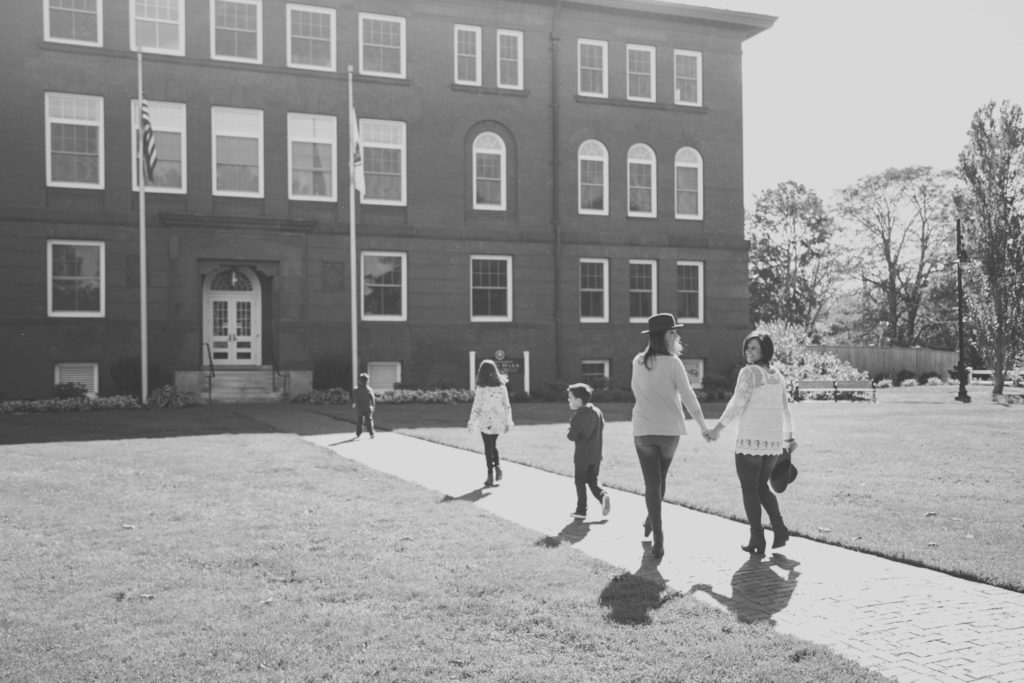I immediately smiled big because this was an easy question for me and it has been for a long time now.
“Well, I prefer “bonus” over “step” or “extra”, personally. A bonus is something you don’t expect to have, but that you’re really happy you do have! And that’s why I’ve always considered you my bonus-kids! I didn’t know I’d have you all in my life, but I am so lucky that I do!” I told her, and she smiled just as big.
“Perfect she said, you are my bonus-mom!”
Years ago when my bonus-kids first entered my life, we didn’t really think in terms of labels or definitions. Our sons were just a year and our daughter wasn’t even four yet, they didn’t ask these kinds of questions so we didn’t need to define what role we played. I never really thought much about it, the label that is, and I still can’t even remember the first time someone referred to me as a step-mom.
I remember knowing it was of course a true statement, in that our society has termed any non-biological parent entered into parenthood by a relationship or marriage as the “step” parent, but never feeling very connected to the term. “Step”, I imagine, was to signify one step removed, and in this case, the biology specially removed. And while I understood that part (of course these children did NOT grow in my body), I never felt in any other ways removed. I was fully included; having a partner who was a SAHM and working full-time out of the house myself, we were both with the children nearly all day, every day. I helped parent in all the ways any parent would, and I never felt removed from much of anything.
Regardless of my involvement or how included my partner wanted me to be in our kids’ lives, I know that for me, being a bonus-parent has always had more to do with my own outlook on parenting than anything else.
I grew up in a blended family and I learned at a very young age that blood isn’t necessary for love. I watched my half sister call my biological father “dad” for all the years of our childhood, even though he was technically her “step” father. I became incredibly close with my step-siblings at the age of 12, after knowing them for only a short period of time. And as an adult, I formed a lasting connection with my step-siblings’ mother and saw her as another mother-figure in my life. These were all nontraditional family roles, but they all provided the same love that my biological family members provided. For me, it was always about the bond, not the blood.
As I started thinking more about the kind of family I might want as an adult, I realized that I had a yearning to be a parent, but that was all that was important to me – that I would have children I could provide parental love and guidance to, learn from, and enjoy. Biology never entered the equation.
So when I found myself in love with a woman who had three biological children when I had none (biological or otherwise), my feelings were simple. I loved her, and they were an extension of her, so I loved them just the same.
I know that for many adults who find themselves in relationships with single parents, the feelings aren’t always quite so simple. Whether because of the age of the children, the situation with the other parent, or already having biological children of their own; some adults find bonding with someone else’s biological children – especially when those children have two biological parents in their lives – extremely challenging. And despite having an incredibly complicated situation in many ways, perhaps in this respect our situation was not so complicated. I had parental love to give and no children to receive it. My partner had children who were receiving parental love, but who she believed could always benefit from more. So we always loved freely, openly, and honestly.
Now, that is not to say that being a bonus-parent hasn’t come with it’s own unique challenges. Our children have two biological parents across two households, and time is and will forever be shared with our children. That alone, I believe, is the most difficult part of being a bonus-parent. We are granted a beautiful gift, but it is not a gift we are able to experience everyday. Yet, although we may not be able to see our bonus-kids each day, the amazing part of parenting (bonus or otherwise), is that our children are, in some way or another, always with us. Their presence in our lives means that they are forever present in our hearts and in each moment of all of our days.
And this is a lesson all parents learn as their children age and go off into the world, but maybe it’s a lesson that those of us who share our children are forced to learn earlier. And although it may be challenging, I choose to see it as a benefit of this experience. We are forced to appreciate the moments we do have, because those moments without our children show up like clockwork.
So I can’t say that my love for our children is the same as a mother’s love for her biological children. I can’t say that my love for our children would be the same if I had biological children of my own. I can’t say those things because I simply don’t know, and I likely never will.
What I can say is that these are the children in my life, these are the children I have chosen to love, and these are the children who receive all of my parental support, guidance, and advice. These are the children that take up so much real estate in my heart and who I fiercely love and protect, every day. Whether in front of me or off making their mark on the world, I am forever grateful for the imprint my bonus-kids have left on my heart.

